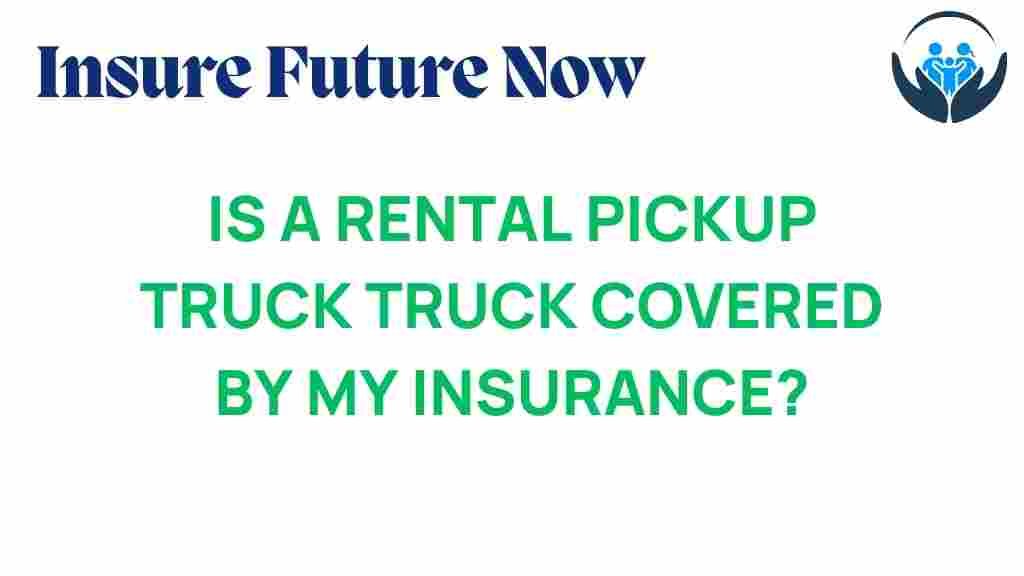Is Your Insurance Ready for a Rental Pickup Truck?
When planning a move, a weekend getaway, or any project requiring a bit more space, many people consider renting a pickup truck. However, before you hit the road, it’s essential to ensure that your insurance coverage is adequate for a rental pickup truck. This article will guide you through understanding your auto policy, the necessary insurance claims process, and the various coverage options available for rental vehicles.
Understanding Rental Pickup Truck Insurance Coverage
Renting a pickup truck can be an excellent solution for transporting large items or tackling a DIY project. However, the question remains: is your current insurance policy sufficient for this type of vehicle? Let’s dive into the specifics of insurance coverage for rental pickup trucks.
Types of Insurance Options for Rental Vehicles
When you rent a pickup truck, you generally have several options for liability protection and coverage:
- Your Current Auto Policy: Many personal auto policies extend to rental vehicles, but coverage can vary.
- Rental Company Insurance: Rental companies offer their own insurance options, including collision damage waivers and liability coverage.
- Credit Card Coverage: Some credit cards provide rental vehicle insurance if you use the card to pay for the rental.
Step-by-Step Process: Preparing for a Rental Pickup Truck
To ensure you are adequately covered when renting a pickup truck, follow this step-by-step process:
Step 1: Check Your Current Auto Policy
Before renting a pickup truck, review your current auto policy. Here are some questions to consider:
- Does my policy cover rental vehicles?
- What is the extent of the coverage? (liability, collision, comprehensive)
- Is there a limit on the type of vehicle covered?
Step 2: Understand Rental Company Policies
When you rent a pickup truck, the rental company will offer various coverage options. Here’s what to look for:
- Collision Damage Waiver (CDW): Covers damage to the rental vehicle.
- Liability Coverage: Protects you against claims from third parties.
- Personal Accident Insurance: Offers coverage for medical costs for you and your passengers.
Step 3: Consider Credit Card Coverage
Many credit cards provide benefits for rental vehicles. Check with your credit card provider to see if your card offers:
- Rental vehicle insurance for damages
- Liability coverage
- Coverage for theft
Step 4: Compare Costs
Compare the costs of adding coverage through the rental company versus relying on your own insurance coverage. Sometimes, it may be cheaper to use your personal policy. However, this depends on the extent of your coverage.
Step 5: Document the Condition of the Vehicle
Before driving off, document the condition of the rental pickup truck. Take photos of any existing damage and ensure it’s noted on your rental agreement. This documentation can be crucial for any future insurance claims.
Common Insurance Issues with Rental Pickup Trucks
Even with adequate preparation, issues can arise when renting a pickup truck. Here are some common problems and troubleshooting tips:
Problem 1: Damage to the Rental Vehicle
If you damage the rental pickup truck, report it immediately to the rental company and your insurance provider. Depending on your policy, you may need to pay a deductible.
Problem 2: Liability Claims from Other Parties
If you’re involved in an accident while driving a rental pickup truck, and another party files a claim, your liability coverage will come into play. Ensure you notify your insurance company promptly to handle the claim efficiently.
Problem 3: Misunderstanding Coverage Limits
Always clarify your coverage limits with your insurance provider and the rental company. Misunderstandings about limits can lead to unexpected out-of-pocket costs.
What to Do in Case of an Accident
In the unfortunate event of an accident while driving a rental pickup truck, follow these steps:
- Ensure everyone’s safety and call emergency services if needed.
- Exchange information with the other parties involved.
- Document the accident scene with photos.
- Notify the rental company and your insurance provider.
- Fill out an accident report if required.
Conclusion: Be Prepared for Your Rental Pickup Truck Experience
Renting a pickup truck can be a convenient way to handle various tasks, but ensuring that you have the right insurance coverage is crucial. Review your current auto policy, understand the coverage options offered by the rental company, and consider any credit card benefits that may apply.
By taking the time to prepare and understand your liability protection and insurance claims process, you can enjoy a smooth rental experience without worrying about unexpected issues. For more information on insurance and rentals, check out this helpful guide on insurance coverage for rental vehicles.
Whether you’re planning a short trip or a longer project, being informed about your options and responsibilities regarding temporary rentals will help ensure that you have a successful and stress-free experience.
This article is in the category Coverage and created by InsureFutureNow Team
